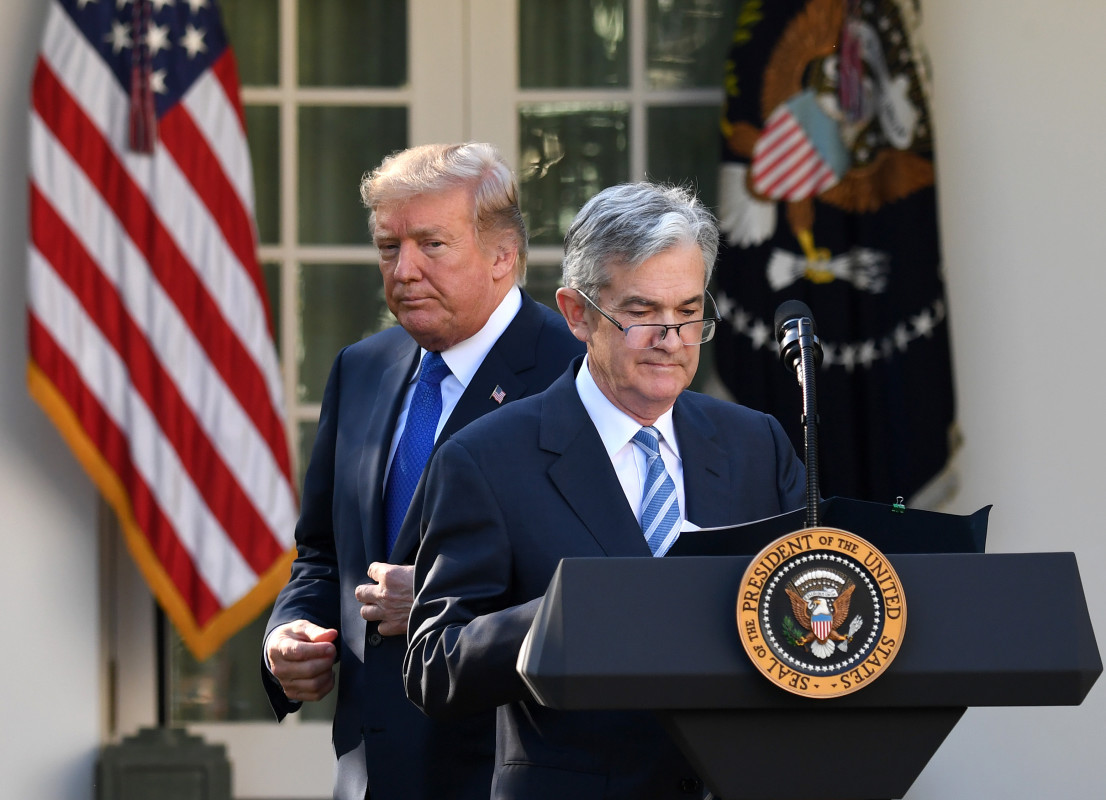President Donald Trump, on Friday, announced a message from the Florida golf course, renewed his invitation to reduce the interest of federal reserves in the midst of the worst two -day sale on Wall Street of Global Pandemic.
The chairman of the federal reserve of Jerome Powell, indirectly responded to the stage of the economic event in Washington’s suburban, said he and his colleagues were in “not in a hurry” to change the course.
💵💰Don’t miss the move: Subscribe to The Straet’s Free Daily Bulletin 💰💵
Different views and stoic determination of the President in focusing on the delivery of price stability and full employment suggest that anyone who bets on the so -called Fedan Stat will probably be disappointed.
“Although the insecurity remains raised, it now becomes clear that the tariff increase will be significantly higher than expected,” Powell said, implying what will probably be the biggest American levy in the century. “The same is likely to be true for economic effects, which will include more inflation and slower growth.”
The shares are deep in the largest sale in the five years, with a lost trillion market value, accelerated risks of recession, and concern about the stagflation spectrum in the world’s largest economy.
Investors generally seek some form of support during permanent or messy declines on the market, and more recently, the FED has assisted in the form of coordinated rescue banks, liquid lines and, in some cases, lower interest rates.
Trump’s global Gambit Tariff has renewed hopes for this so -called Fed Status, which draws its name on the product on the market option that protects investors from the risk of lack.

Federal Futures Trading Funds suggest that markets are betting on May, with at least four further decreasing a quarter of points over the next eight months, which would reduce the Central Bank reference rate at 3%.
I think these hopes are likely to be broken.
Long -lasting trade war bad for all
Long -term trade war, firmly put on Friday in the form of retaliation from China, will be unequivocally bad for both American and world economy.
The American economy, which has already taken place from Trump’s tariff threats during the first quarter, has now been prepared for recession, according to Wall Street forecasts, as consumption is slowed down, exports and freezing business investments.
At the same time, it will be expected that consumers with higher prices will be paid as a result of a tariff regime, which could amount to about $ 1000 for each household with lower revenues in the country, inflation will be hoped.
Related: Trump’s tariffs raise us the recession and risks of stagflation
Settlement of the fact that greater prices are likely to be greater consequences for the FED from slowing down growth – the central bank focused on the pressure of inflation due to the weakness of the labor market in its twin mandate – the Fed reaction will probably follow what investors are already expressing in the stock market.
In the midst of a wide tariff discussion, corporate earnings become swallowed, with the growth assessments of the first quarter for the S&P 500 fall to about 10.6%, and probably lower, from 17.1% of the Tempo recorded during the fourth quarter 2024.
Earnings need to grow. But I can’t.
The direction on the stock market will be largely dictated by the growth of earnings. And individual shares prices, as well as reference indexes, are basically reflecting what investors are willing to pay now for profit realized in the next 12 months.
Companies can only increase earnings if the economy spreads. And I can expand my profit margins only if they can transfer the price increase, related to the new tariff matrix, American consumers.
Related: Goldman Sachs Analysts overhaul S & P 500, GDP goals while Trump’s Tariffs bites
If that make It happens, inflation pressures are likely to accelerate significantly beyond the preferred Fed Fed of 2%, which makes it difficult, if not impossible, short -term reduction in interest rates.
On the other hand, if companies are not able to convey tariff influences, they will see that their profit margins narrow and profit growth slow. And while this could draw some inflation from the domestic economy and strengthen the case of reducing the Fed rates, this would not force investors to pay higher prices for US shares.
More economic analysis:
- The golden price hit speed of speed; Where is it from here?
- 7 Application of Fed Chairman Jerome Powell
- Retail sale adds a new complication to the forecasts of reduction of FED rates
In other words, the Fed will be prevented from reducing as a result of greater inflation or reduction of the rate as a result of a fall in domestic growth.
No one is likely to support American shares, which are already traded on a historically high multiple. They are far more expensive than their European peers, with the indexes too relied on the megacap tech and magnificent 7 shares, which have fallen on the market on the market earlier this week (at least 20% below the recent maximums).
The Bank of America strategic, led by Michael Hartnett, says the recession could withdraw S&P 500 to as many as 4,800 points, which is 7% drop from current levels. But they are advocated by the “All-in” bet after that, if the approval grades force Trump to withdraw to tariff policy.
Hartnett describes such a move as “Trump’s path”.
I think this is much more likely and much more effective than any supporting Fed action.
